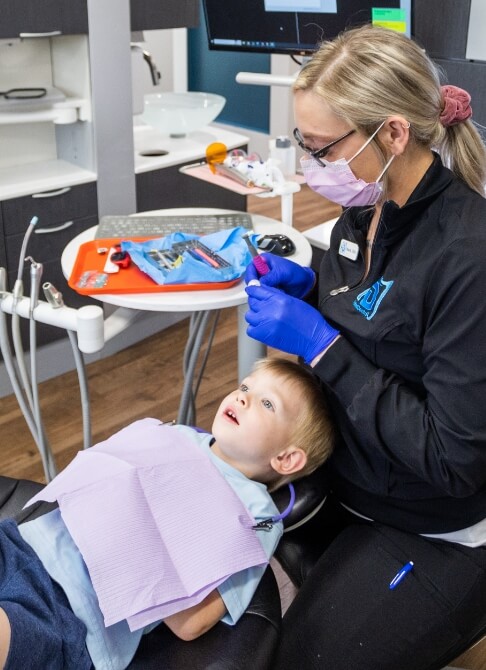

Lip and tongue ties are not as uncommon as you might think. Although many individuals never experience issues, others experience challenges that start during infancy. When tethered oral tissues (TOTS) make it difficult for breastfeeding mothers to nurse their children effectively, it can create a range of emotions and issues that affect both the mother and baby. This is why Hyland Dental is pleased to offer laser frenectomies to improve oral movement and overall health. Call us if you think your child might be suffering from a lip or tongue tie.


Tongue tie (ankyloglossia) occurs when the band of tissue below the tongue (lingual frenum) is abnormally thick or restricts range of motion. This condition is developmental, since it arises before birth, and research estimates that 4-11% of infants have a restricted frenum. A tongue tie can affect nursing and bottle feeding. It can also have a negative impact on growth and development from childhood into adulthood.
Lip tie occurs when the tissue attaching the upper lip to the gum tissue (labial frenum) is abnormally thick, tight, or inelastic. If the lip can’t flip up without the frenum attachment blanching (turning white), this reduced range of motion can lead to problems.
A lip or tongue tie forms while a baby is still in the womb. As the frenulum (also called a frenum), which is the band of tissue located behind the upper lip and/or underneath the tongue, forms, it will usually extend over time and allow the baby to move their tongue and/or lip freely. However, if this does not happen, it can restrict a baby’s oral movement, making it difficult to perform normal tasks such as nursing or taking a bottle.
Some of the most common symptoms associated with a lip or tongue tie include:
A tongue tie can affect breastfeeding in an infant in many different ways, but generally, a poor latch leads to inefficient milk transfer, and the baby has no choice but to compensate. Often a tongue-tied baby with a restricted tongue will attempt to nurse by chomping or gumming the nipple, popping on and off the breast, and breaking the seal, leading to excess intake of air and a clicking noise when nursing. Mom experiences nipple pain and trauma as well as poor milk transfer which can lead to decreased milk intake, a drop in milk supply, poor breast drainage, feelings of frustration, failure, guilt, and shame, and premature weaning.
A tongue-tied adult may have a history of speech difficulties, mouth breathing, a high arched palate and narrow jaws, crowded or misaligned teeth, acid reflux, and snoring or sleep apnea.
A lip tie can lead to problems with nursing, bottle feeding, eating solids, and increased risk for cavities. During nursing, the upper lip needs to flare out to create a seal on the breast for a good latch. A poor latch can lead to excess air intake and gassiness.
In an older child, a tight frenum can cause pain when parents try to lift the lip to brush the top front teeth and can also trap food against the teeth and lead to dental decay.
Seeking treatment for your baby’s lip or tongue tie will immediately allow for a greater range of motion so that they can begin to eat normally, eliminating the challenges that were once in the way.

Watching your baby struggle with a lip or tongue-tie does not have to be your reality thanks to a procedure known as a frenectomy.
Watching your baby struggle with a lip or tongue tie does not have to be your reality thanks to a procedure known as a frenectomy.
At Hyland Dental, we use a soft tissue laser to gently and quickly release the tethered tissues so that the tongue and/or lip can begin to move freely. When performing this type of procedure, we will take steps to ensure that your baby is calm and comfortable. The laser is a precise tool that works quickly to modify the tissue while reducing the amount of bleeding, swelling, and possible post-operative infection.

A frenectomy (or “release”) reshapes the tissue under the tongue or upper lip to allow for better range of motion. After a thorough evaluation, this procedure is performed to allow for the tongue and/or the lip to function properly during swallowing and/or latching at the breast or bottle. Any frenectomy procedure is always preceded by a consultation with the parents about how the ties might be affecting the child as well as what the potential benefits of treatment may be. Benefits usually include better lip and/or tongue function to improve swallowing and/or latching at the breast or bottle, along with better development of the oral cavity and airway. At this point, the parents can then choose how they would like to proceed.
Babies may experience: Moms may experience:
Benefits of Laser Frenectomy
When it comes to making sure your baby is ready for a frenectomy, you’ll want to spend much of your time providing them with plenty of attention. This helps to keep them calm. It is also helpful if you feed your baby before their procedure (1-1.5 hours before), as this will increase the chances of them being hungry following the frenectomy, making it easier to encourage nursing.
Maintaining an upbeat attitude is helpful, as babies are observant, so they can easily pick up on any fear or stress you might be experiencing.
It is also helpful to incorporate some exercises so that your baby begins to use their tongue to create suction (i.e., allowing them to suck on your finger).
Although it is natural to want to be in the room with your child during this process, it is better if you wait outside. The reason is that the child can become distracted, or you may become squeamish by what you’re looking at. Children pick up on parents’ behaviors and will respond accordingly, which can make the procedure more difficult.
Our team at Hyland Dental can more easily focus solely on your child if you wait outside. But don’t worry, as we will let you back in immediately after we finish so that you can be with your child.
One of the greatest benefits of frenectomies is that they only take a few minutes to complete. This is great news, especially when it comes to an infant. Because we use a soft tissue laser, the procedure itself is fast and effective. However, if the lip and tongue tissues both need to be released, it will naturally take slightly longer.
When meeting with our team about your child’s frenectomy, you can expect that we will discuss the length of time they will spend in the dentist’s chair before being able to return home.
Many parents with babies who are receiving frenectomies want to know when they can begin nursing following the procedure. The good news is that it can begin immediately after. Our team at Hyland Dental will allow you and your child time to nurse, encouraging the new movement of their lip and tongue. It’s not uncommon for there to be a bit of a struggle initially; however, the moment your child realizes that they have greater oral motion, they will begin to nurse or take a bottle more easily, making the feeding process much more enjoyable for everyone.
For most parents, the idea of their infant undergoing any procedure, including a frenectomy, can often seem overwhelming or scary at the beginning. Even so, there isn’t a set time or age minimum for treating a lip or tongue tie. In some instances, this treatment can be performed even several days after birth. It’s also important to remember that a lip or tongue tie will not vanish by itself over time, so there isn’t a reason to delay the procedure. The earlier you let your child undergo the treatment, the sooner they can have improved breastfeeding and oral function.
In other cases, a local anesthetic will be administered so that the patient doesn’t feel any discomfort during the procedure. However, since our practice performs laser frenectomies, we might even need to provide your little one with anesthesia! Due to advanced laser dentistry technology, we can target the excess tissue with great precision while also cauterizing the tissue so that there isn’t much or any bleeding during the treatment. Of course, if we notice that the lip or tongue tie has especially thick tissue, then it might be necessary to provide a local anesthetic. Our team will discuss this during your child’s initial consultation.
It is quite normal for babies to cry somewhat before, during, or after a frenectomy. That said, their crying isn’t typically related to any pain or discomfort from the procedure. In most cases, babies simply don’t like their lips or tongue tie being held and there isn’t a clear way for them to express this. Should you hear your little one crying during their treatment, this doesn’t mean that something went wrong or that they’re feeling pain. Our team understands the situation and will do everything we can to work as efficiently and carefully as possible so that they can have a more comfortable and problem-free procedure. Remember that a frenectomy can significantly improve their oral health and quality of life, and we will certainly keep their best interests at heart.
Having a restrictive lip or tongue tie that doesn’t get treated can have certain ramifications in the long run. As infants, your child might not be capable of breastfeeding or bottle feeding properly or comfortably, which can have an impact on their weight gain in the long term. The older they become, the more likely they’ll struggle with daily oral habits, such as chewing solid foods and speaking clearly. As an adult, they can end up experiencing complications with poor oral health, neck and shoulder pain, sleep apnea, and more if they don’t undergo treatment.